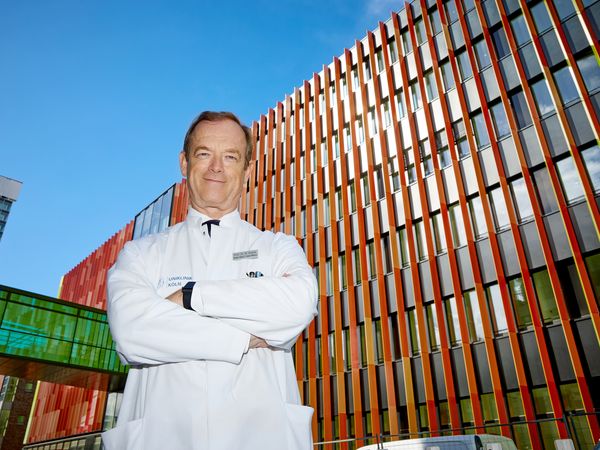Professor Hallek, you are the founder and director of the CIO, the Center for Integrated Oncology at the University Hospital of Cologne. How do the University Hospital and the CIO work together?
The CIO is part of the University Hospital. Our centre combines everything at the University Hospital that has to do with cancer. We have 40 different clinics, centres or institutes here that deal with cancer, such as pathology, radiology or internal medicine. The aim of the CIO is to bring specialists together in one place so that we come to the patient and the patient does not have to go out of his way to find us.
In the summer, the CIO will open its own building in the middle of the university hospital campus. What will happen here in the future?
Our work is characterised by the idea of integrated collaboration between all disciplines for the benefit of cancer patients. The new building is the architectural prerequisite for this. It is easy to underestimate the creative power of architecture. When you work together in a building, in rooms that promote interaction, you meet ten times more often in your daily work. The aim is to integrate specialists who sometimes work in isolation from one another through architecture!
Why is networking so important today?
Over the last ten years, there has been an explosion of knowledge in cancer research. If you want to provide the patient with the best possible treatment, you have to create networks and teams. And you have to do it in a more comprehensive way than ever before. The rules for the work have changed completely. For this we need new structures with a permanent network. One solution for successful and networked work structures is provided by the CIO building.
You want to throw old rivalries overboard and have founded a joint cancer centre with the university hospitals of Aachen, Bonn and Düsseldorf. What advantages will this bring for individual patients?
Because you don't have enough resources on your own, you have to concentrate in your research to make it efficient. The same applies to our colleagues in Aachen, Bonn and Düsseldorf. When we work together, our work becomes complementary: we gain more research capacity. If a doctor in Aachen is researching a disease that is not the focus of research in Cologne, our patients benefit directly. We also become stronger through joint clinical studies. By combining and evaluating our data, we become faster. The individual patient also benefits from this.
Over the past 15 years, the Cologne site has developed into one of the top oncology sites in Germany. How did this come about?
We have an excellent board of directors at the clinic who have been able to ensure that we are economically sound. We have also created an atmosphere of trust. Like economic success, this is a basic prerequisite for research and good medicine. Secondly, the state government has given us a lot of support and created good conditions. Thirdly, you naturally need good minds. In Cologne, a large number of good people have been appointed in a short period of time, and they work well together here.
They studied and did research in Regensburg, Munich, Paris and the United States. Before you came to Cologne University Hospital, you were offered a C-3 professorship in Munich. How does a Bavarian feel in Cologne?
Very well! I do miss nature and the mountains a bit. But as far as human interaction is concerned, which is crucial for life, I and my family have an extremely good attitude towards life in Cologne. I have been warmly welcomed by the people here. The Rhinelanders are a very open-minded people. They are communicative. That makes it very pleasant in everyday life.
